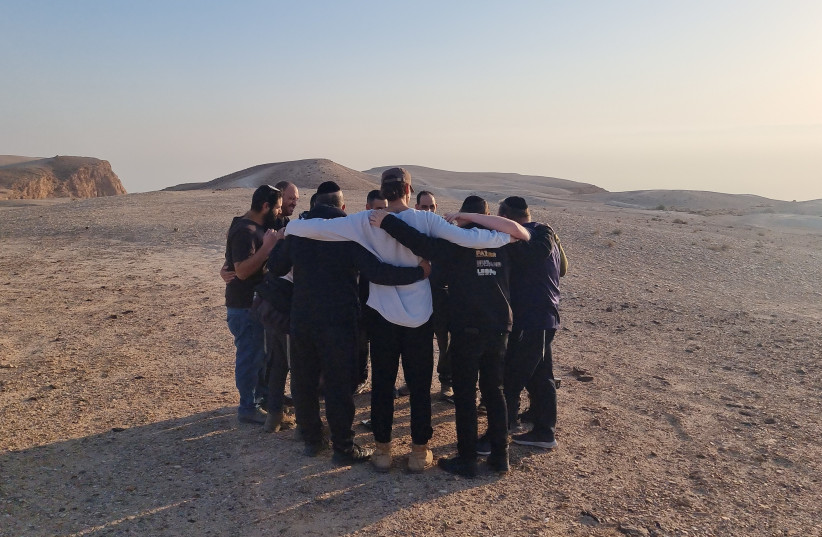Since the traumatic events of October 7th, various groups have been indirectly affected, bearing witness to the aftermath through their professional roles.
"Many are suffering without direct exposure to the initial events, carrying the burden of the aftermath," notes the founder of Mashiv Haruach. This organization steps in to offer crucial support to these secondary victims.
Upon entering the secluded Metzoke Dragot accommodation complex overlooking the serene Dead Sea, the calming desert landscape and minimalist beauty offer immediate relief.
"The moment you arrive, the tranquility begins to take effect," describes a participant, underscoring the retreat's soothing environment. Participants of the Mashiv Haruach retreat begin to unwind from the intense experiences of the past three months.
Who are the participants of the organization?
The participants are members of the Kibbutz Movement who, since October 7th, have tirelessly supported residents around the Gaza envelope—arranging funerals and aiding families of terror victims, hostages, and evacuees, all while facing secondary trauma themselves.

A recent retreat catered to national Rescue Unit 360 volunteers, who endured the harrowing task of locating and identifying human remains alongside security forces. The program also extends to soldiers and doctors from the Shura base engaged in the grim work of identifying murder victims.
Eyal Kravitz, founder of Mashiv Haruach and a retired navy colonel, encourages participants to take a two-day break to focus on their well-being before resuming their critical roles. Kravitz, feeling constrained by retirement during a time of conflict, was compelled to act. “This is the first war since my retirement, and I felt like a caged lion. I had to do something,” he admits.
Mashiv Haruach, relying solely on donations, aims to provide emotional support and resilience tools to these individuals, many of whom suffer from severe anxiety, sleep disturbances, poor appetite, and difficulty concentrating at work.
"We provide a tailored approach to help each group manage their specific challenges," explains Sarit Zohar, a team psychotherapist. Unlike government-sponsored individual treatments, Mashiv Haruach offers a group-oriented approach that addresses the broader spectrum of affected individuals.
A vision to help lower post-traumatic stress
The organization’s goal is to prevent future post-traumatic stress, with a vision to support 2,000 participants annually. The full program includes supportive group workshops, follow-up meetings, and referrals to individual care when necessary.
Team member Daniel Chermon, a veteran of the second Intifada, attests to the transformative power of group therapy, inspired by his own therapeutic experiences.
"The strength of the group sessions is life-changing," Chermon shares. The retreat features morning walks, group therapy sessions, "healing sounds" in a Bedouin tent at sunset, and evenings around a campfire with music, providing participants with a rare opportunity to vocalize their experiences and emotions.
Participants have expressed profound benefits from the retreat, finding renewed strength and spirit to continue their work and personal lives.
"At the end of the workshop, I felt liberated, happy, full, and able to continue," a participant reflects. Another adds, "These two days have strengthened my spirit and provided me with a kind of victory of spirit and faith."
Avraham Filos, a volunteer with unit 360, shared how the program helped him integrate his traumatic experiences from the first Lebanon war into his current life, enhancing his societal integration and mental well-being.
"Here I received the tools to cope and integrate into society much more easily," Filos appreciates.
Yael Sharon, a medical psychologist who now leads sessions at Mashiv Haruach, relayed positive feedback from Kibbutz Movement participants, emphasizing the significant impact of group dynamics and shared experiences in fostering personal growth and resilience.
"The feedback was exciting. People talked about how they managed in little more than 24 hours to go through a real process… discovering something new about themselves," she reports.
As the program continues to receive endorsements, Yael Eisner, director of the Kibbutz Movement’s program for lone soldiers, advocates for extending such supportive measures to all organizations, reflecting on the profound change in her professional approach and personal resilience.
"It's a huge gift. I work differently today, remembering that it's okay to say when it's hard, to be empty and then to be filled again," Eisner expresses.
